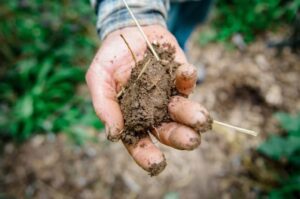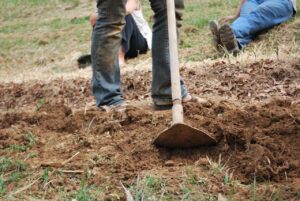Soil and water are two foundational elements of gardening, farming, homesteading, permaculture…and life on Earth. But soil and water are not homogenous materials. In fact, they’ve got myriad different qualities around the globe and even around one garden or homestead. When you’re starting out, it’s pretty easy to test your soil and water to get a sense of what you’re working with. Re-testing every few years provides a great check-in and allows you to tweak management over time.
Understanding the chemical properties of your soil and water can inform so much of what you do. It’ll help you decide what you to grow, which amendments to add, and how much, and whether or not you feel safe drinking and using your water. This is an important step to living off the land using permaculture principles.
Soil Testing for Minerals
Note: Some of the links below are part of an Amazon affiliate program. When you click them, we benefit (at no cost to you). If you want to find these items locally, more power to you! If you’re going to buy them online, clicking-through here helps us continue offering free information and resources to everyone.

Most county agricultural extension offices will analyze soil samples for free (just search “(your county) agriculture extension service”). Some ask for a small fee. Such tests give you some baseline data, like soil pH, nitrogen, phosphorus, and potassium. However, extension office tests are are more geared toward chemical agriculture, and not organic gardening and permaculture. For a more ecological approach, Logan Labs does a great job. They also charge a small fee. After you receive your results, you’ll be able to use the handy charts from the Soil Analyst Cooperative to interpret your results. These charts will also provide recommended (organic) amendments to correct any imbalances.
The source of these charts is an amazing book called The Intelligent Gardener, by Steve Solomon. Check it out if you want to dive even deeper into soil remineralization for nutrient-dense crops.

Soil Testing for Biology
Another aspect of soil health is biology. The tests above just look at the chemical properties of soil, not soil life. Health and fertility is an interplay of these factors, along with the physical structure of soil known as tilth. We have a wonderful local provider of soil microscope analysis in Asheville, Meredith Leigh, who happens to also be a past instructor for some of our classes. Check this out to learn about testing your own soil biology with a home microscope, Mail-order analysis is also available from various labs. To learn more about all the aspects of soil health, check out our Online Gardening School.
Water Testing
The easiest, cheapest option for water testing is to purchase a home water testing kit. These kits cover the basics like: most heavy metals, bacteria, nitrates, and nitrites. For professional testing services, visit the EPA Directory of Water Testing Services by State and look up the state where you’ll be living off the land, then find a local option.
If you know that your water source has been exposed to industrial or agricultural chemicals, be sure that the test you use will find them. In order to determine the levels of a particular contaminant in water, the test must specifically look for that.




